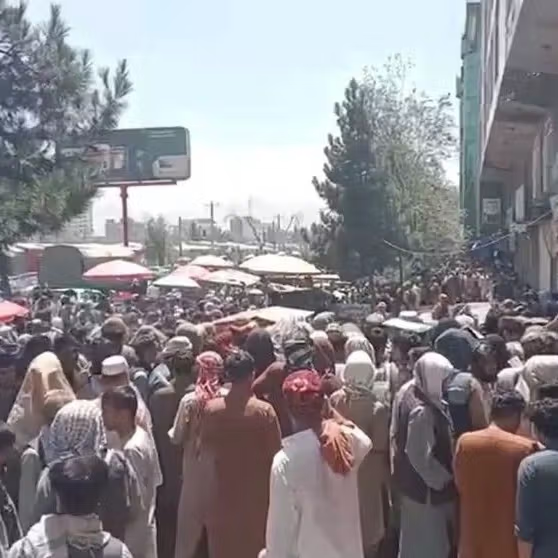RASC News Agency: Amid a worsening unemployment crisis in Afghanistan, thousands of desperate jobseekers have turned their hopes toward Qatar, where a Taliban-facilitated overseas employment program was advertised as a potential lifeline. However, internal documents and testimonies from credible sources have cast serious doubt on the integrity and purpose of this initiative. Far from offering real economic relief, the Taliban’s recruitment process appears to be little more than a stage-managed spectacle marked by bureaucratic opacity, unrealistic requirements, and entrenched favoritism.
A leaked document, circulated on social media and obtained by several media outlets, reveals that the bulk of job openings designated for Afghanistani workers in Qatar are in fact low-skilled and poorly paid positions such as janitors, cleaners, domestic staff, dairy handlers, and cooks. Paradoxically, these modest roles are accompanied by disproportionately high eligibility criteria, including the requirement of a university degree or prior experience in luxury, five-star hospitality settings. For most applicants many of whom have been deprived of educational opportunities under Taliban rule these demands are seen as both illogical and deeply exclusionary.
Numerous applicants told Afghanistan International that they were forced to wait for hours under the blistering summer sun, only to be dismissed with vague justifications such as “insufficient documentation” or “failure to meet the necessary conditions.” The process, they say, offers no clarity, no accountability, and no guarantee of fair evaluation. Instead, it seems to function as yet another instrument of Taliban control offering access only to the well-connected. Sources within the Taliban’s Ministry of Labor and Social Affairs have privately acknowledged that many of the shortlisted candidates are not randomly selected from the general public, but rather pre-approved affiliates of the Taliban or relatives of local commanders. In several reported cases, visa applications for these individuals were submitted even before the official registration process had begun indicating that the public job drive may have been largely symbolic from the outset.
This blatant nepotism has fueled widespread anger among Afghanistan’s youth many of whom wait in long, disorderly queues outside provincial labor offices, often for days, without receiving any official explanation of their status or likelihood of selection. The process has become a source of both humiliation and hopelessness, further deepening the public’s mistrust in a regime already plagued by allegations of systemic discrimination and administrative failure. Despite earlier Taliban claims that the employment initiative would encompass 14 specialized technical sectors, the leaked job list includes only two skilled roles: electrical engineering and electric vehicle maintenance. The overwhelming majority of available positions remain basic labor jobs contradicting the regime’s promise of a diversified and skilled workforce export program. This inconsistency underscores a recurring pattern in Taliban governance: inflated rhetoric masking operational incompetence.
In Nangarhar province, several applicants reported being asked to present university degrees even for roles as cooks. Taliban officials allegedly demanded proof of work experience in prestigious restaurants or hotels, raising questions about the real purpose of such requirements. For many, these conditions appear deliberately crafted to filter out ordinary applicants and preserve opportunities for regime loyalists. The Taliban’s Ministry of Labor formally launched the initiative on July 28, instructing applicants to register at designated provincial centers. Yet the ministry has failed to publish any details regarding provincial quotas, salary structures, insurance coverage, or the legal rights and living conditions of workers once deployed in Qatar. This lack of transparency has only fueled public skepticism and criticism.
Images and videos shared widely on social media illustrate the grim reality of the registration centers: overcrowded lines, chaotic administration, and visible mistreatment of applicants. The footage has provoked a wave of condemnation, with many Afghanistanis denouncing the process as both dehumanizing and deceitful. Although Taliban officials continue to tout the Qatar labor scheme as a cornerstone of their economic strategy, mounting evidence indicates that the initiative functions primarily as a tool of patronage, not public service. Rather than addressing unemployment or creating equitable opportunities, the program has been weaponized to reward political loyalty, project a false image of effective governance, and deflect international scrutiny.
In practice, what was marketed as a national employment drive has become a grim symbol of Taliban dysfunction where jobs are dispensed not on merit or need, but on allegiance to a regime that has systematically dismantled educational institutions, suppressed women’s participation, and reduced governance to a closed circle of ideologically vetted insiders. For most ordinary citizens, especially the young and unemployed, the Qatar labor initiative is not a path to opportunity but a reminder of just how deeply the Taliban has failed to serve the people it claims to rule.






